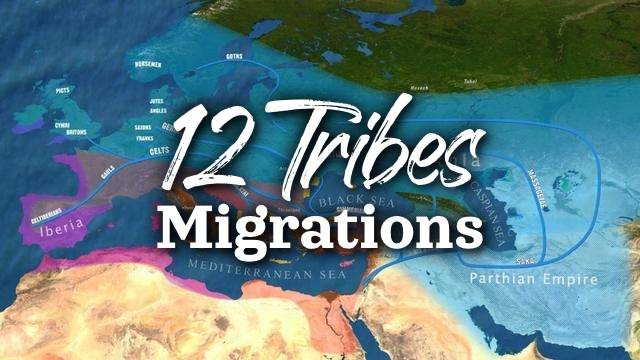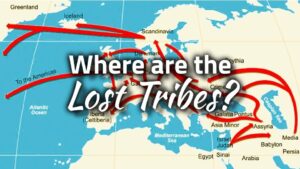Latest Posts
What is Fornication?
What is Fornication?
In the last presentation of our marriage series, we discussed the fact that in the Biblical view and therefore in the eyes of God: sex before marriage is impossible, for sex is marriage. We then discussed how this in fact puts more accountability towards a man, and not less. We concluded the video presentation by explaining how the church claim that fornication is “sex before marriage” is a blatant lie: as marriage was not understood by these terms by anyone during the time of Christ. In fact, churches didn’t even begin to record marriages until the 1500s.
The next question we must answer is natural: what is Fornication in the Bible?
Licentious Sex
Fornication comes from the Greek word porneia. In its literal definition, it means prostitution. But the word is more versatile than that. In both the Bible and secular Greek writings, it is used to refer to a variety of licentious sexual relations, such as homosexuality, adultery, and miscegenation. Think of it as an umbrella term for several different deviancies.
The Understood Terms
Understanding that marriage is legitimate sex and that fornication is licentious sex: then fornication naturally represents any kind of sexual relationship which is prohibited in the Law. At a first glance, there are some well known transgressions which are still thankfully noted by at least a few so-called churches. An example would be homosexuality, a sin that warranted the destruction of Sodom, and a sin that is just as evil today as it was then: as witnessed by Paul (Romans 1, 1 Cor 6:9)
According to Liddell & Scott, Phalarus, a Greek writer of the 6th century BC, as well as Demosthenes, a Greek writer of the 4th century BC, both used πορνεία to describe sodomites.
From Leviticus chapter 20: “13 If a man also lie with mankind, as he lieth with a woman, both of them have committed an abomination: they shall surely be put to death; their blood shall be upon them.”
Another definition would include incestuous relationships, even with in-laws who are not necessarily blood kin. In his first surviving epistle to the Corinthians, Paul notes a man who had slept with his father’s wife (not necessarily his mother) and calls him a fornicator. This would be a transgression of Deuteronomy 22:30 “A man shall not take his father’s wife, nor discover his father’s skirt.”
In the Septuagint, πορνεία was frequently used in reference to idolatry, as the Israelites were commanded to remain separate from the other nations. Christ uses these two transgressions in connection with one another in the Revelation. (mention usage in old testament)
In the Old Testament period, the Israelites were indeed committing adultery against their Husband, Yahweh. Adultery would also be included as one of the applications of fornication, but it is often regarded to separately. In fact, it is for the reason that fornication has such a wide usage that it can never be restricted to a single definition. Many of its definitions are often found listed alongside it. For example, fornication cannot solely be homosexuality as it is listed alongside homosexuality in 1 Cor 6:9. It cannot solely be adultery as it is included alongside adultery in the same verse as well. Fornication is any and all types of illegitimate sex. Only once the proper term of marriage is understood can fornication also be understood: for marriage is legitimate sex and fornication is illegitimate sex. Illegitimate sex is any sexual relation that transgresses the Law, and it will never be recognized as marriage in the eyes of God, no matter what any state thinks or teaches.
There is an important transgression left to discuss, and it is one of the most common uses of the word fornication in the Bible. (Naturally, the most grievous of all sexual sins is the one which is most ignored, and those who do not practice it are hated by the adversaries of God, as seen in the assemblies of Smyrna and Philadelphia addressed in the Revelation. The sin of fornication is the transgression most condemned by Christ in that same address to the seven assemblies (Rev 2:14, 2:20). This sin is the error of Eve, and it is also the sin of Esau. The enemies of God have distorted it for long, writhing their way into assemblies unaware and justifying their sins to a society which should view their attitudes as abhorrent (Rom 1:32). Their camouflage will not last forever, however. We see that the two assemblies of the Revelation which which followed their anointment (Smyrna) and the commandment of brotherly love (Philadelphia) naturally abhorred fornication. Because of this, they maintained themselves as a separate people and were therefore persecuted by the adversary (Rev 2:10), who always strives to teach and promote fornication. Those of us who follow the laws of God are similarly persecuted today (John 15:20).
Miscegenation
In Jude’s short epistle, he notes fornication as the pursuit of strange flesh (v.7) and why is this so important? We have to understand what strange flesh is. If we go back to the first Adamic union, we see one of the requirements of legitimate marriage expressed by Adam when he exclaims that Eve is “flesh of his flesh” (Gen 2:23). In their union, Adam & Eve obeyed God’s first Law: the Law of kind after kind, as seen in Genesis chapter 1. The commandments were simple, but Eve was later in her isolated state seduced and she then transgressed this law. Eve ate the fruit of another family tree: as trees represent bloodlines in scripture and fruits represent sexual relations. This is not only evident in our Bible, but also in other texts contemporary to Moses’ time. It was at this point, that Eve bore the seed of two separate parties: the seed of the woman (continued through Seth and bore through Adam) and the seed of the serpent (continued through Cain after the union with the serpent). This subject is all laid out in detail in my video titled “Adam Was Not the First Man”.
The law was transgressed again not so many generations after Eden, where we see in Genesis 6 that the fallen angels were once again lusting after the daughters of Adam. This abominable act encouraged God to flood the society, and we can see just how abhorrent fornication is to our God. But we must remember that sin is not imputed unless there is Law (Rom 5:13), so for a flood to be warranted there must have been a Law that was transgressed.
The answer is simple, for it was during the time of Genesis 6 the descendants of Adam were once again eating from the Tree of the Knowledge of Good and Evil. They were repeating the sin of their ancestor Eve, but at this time to an even greater extent. Therefore God punished the Adamic race with a flood which was local to where the Adamic race was living at the time. The flood did not extend to every corner of the globe, as it was not meant for other races or parties. This is why we see recorded in Genesis 15 certain races who traced their lineage back to Cain having survived the flood. God did not miss or provide an ineffective deluge, but rather the flood was not for them.
As Paul equates in Hebrews, sons experience chastisement when they stumble for they exist under the Law and God has parentage (Heb 12:7): while bastards may appear to go unscathed until the Final Fulfillment, for they exist outside of the Law (Heb 12:8, Deut 23:2). Because not all men descend from Adam, there are indeed those who can be considered of strange flesh, and to have unions with them is to eat the fruit of another tree.
It was important for us to briefly re-explore these topics so that we can better understand why the Israelites were allowed to marry some races under certain circumstances (Num 31:9 -Midians being descendants of Abraham through Keturah) and forbidden to marry other races under any circumstances (Num 25 – Moabites being mixed with Kenites, who descend from the bastard Cain). The requirement is not religious, for none of these forbidden parties were ever candidates for conversion. The races forbidden to the Israelites are never traced back to Seth, and we see from Genesis chapter 15 that the Canaanite tribes had mingled themselves with the Kenites, the Rephaim giants, and other tribes which had not descended from Noah. This is not coincidental, and it is the reason behind their excluded state.
When the children of Israel were married to Yahweh on Mount Sinai, they were commanded to be a separate and holy people from these other races. (As seen in Exodus chapter 19:5-6.) Just the same as when Adam and Eve were commanded to keep themselves separate as well, and not adjoin themselves to the other races, to the other tree: not to the fallen angels nor to their descendants. While they did not let a beast touch Mount Sinai, beasts did eventually touch and overrun Mount Zion, which is the body of the children of Israel on Earth (Hebrews 12:20).
As Paul said, not all flesh is the same flesh and ultimately this is all determined by one’s origin. Here Jude defines fornication as race-mixing, which is the only honest way to interpret the pursuit of “different flesh”. One can be a homosexual, an abominable sin, but to define it as different flesh is not proper unless the partner is of a different race. Many times in the Old Testament did men exclaim each other to be of the same tribe and flesh, so it never inferred gender (Gen 29:14, 2 Sam 19:12). Therefore Jude compares it to the sin of the fallen angels, for it is they who shared in the same sin (Gen 3 & 6).
The definition of fornication as miscegenation has several other witnesses in the New Testament.
In 1 Corinthians 10:8, Paul refers to the incident with the men of Israel and the daughters of Moab as fornication using the same Greek word. Those Moabites were of a different race, they were never candidates for conversion, and Phinehas was blessed by God for slaying a fornicating couple. In Revelation 2:14, this same incident is referred to with the same language, which is also associated with the “doctrine of Balaam”, the one who had told King Balak to send the women and seduce the men of Israel.
Esau’s sin was racemixing, and he brought lamentation to his mother Rebekah when he took wives of a strange flesh. Rebekah feared that if Jacob did likewise, that she would then die without legitimate offspring (Gen 27:46). This was a serious reproach not just to a woman in general, but especially to Isaac’s immensely important family. Paul at Hebrews 12:16 calls Esau a fornicator, using a form of the same Greek word once again. It is no coincidence that Esau’s mixed descendants would go on to crucify Christ, and they are referred to prophetically as dogs in the 22nd Psalm. Jezebel, who taught the children of Israel to commit fornication, was eaten by dogs, symbolic of the state of our nations when we allow ourselves to degenerate into such sin (Rev 18:2, Mat 24:37).
Speaking to these dogs who pierced Him, Christ said that if they were children of Abraham they would have acted like Abraham (John 8:39). But through the Hittites, being of Edomite heritage, their blood ultimately traced them back to Cain and in their blood they only got to Abraham as far as halfway through Esau. For this reason, they did the acts of Cain: their ultimate ancestor, the race responsible for the blood of all the prophets from Abel to Zechariah (Luke 11:51). These Edomite Idumeans gained control over Judea after the days of John Hyrcanus, and it is recorded to us plainly in history. Their descendants have today gone back to Palestine to rebuild it, claiming themselves to be Judeans but they are not, for they are liars (Rev 2:9, 3:9). Their presence there is a fulfillment of other prophecies, such as those found in Malachi, which are not the scope of our presentation today.
If all men descended from Adam, then fornication would not be a transgression. But all men do not descend from Adam, and fornication is transgression. In Malachi chapter 2 we see not only that other so-called gods have children, but that Yahweh the God of Israel refuses to recognize those children (1 Malachi 2:10-12).
Judah the patriarch had married a Canaanite woman, the “daughter of a strange god”, and Tamar had to step in to rescue his bloodline. What she did was just. During the time of Malachi, the tribe of Judah just like their patriarch before them, were now hosting Canaanites in Jerusalem (Ezekiel 16:3). How history repeats itself! This dialogue prophesied here in Malachi was fulfilled almost verbatim through Christ’s dialogue with the Edomites as it is recorded in John. When Christ calls them out for not being unadulterated descendants of Abraham, they reply and attempt to assert that “We be not born of fornication; we have one Father, even God” (John 8:41).
Therefore they understood the nature of Christ’s accusation, and they understood this definition of the word fornication. Then, Christ replied and He said to them “If God were your Father, ye would love me: for I proceeded forth and came from God; neither came I of myself, but he sent me. 43 Why do ye not understand my speech? even because ye cannot hear my word. 44 Ye are of your father the devil, and the lusts of your father ye will do. He was a murderer from the beginning, and abode not in the truth, because there is no truth in him. When he speaketh a lie, he speaketh of his own: for he is a liar, and the father of it.” (John 8:42-44)
It was primarily because of Israel’s fornication that Israel was divorced from Yahweh God, for they had committed adultery towards their husband. Having a sexual relationship with those of other races is a violation of Yahweh’s law of kind after kind, to not eat of the Tree of the Knowledge of Good and Evil, and therefore it is an illicit union which can never be counted as marriage. It is also a transgression due to it being adultery, for it violates the commandment of Yahweh that Israel remain separate from the other races. (Exodus 19:5, Psalm 135:4, etc) This admonition is exclusive to the children of Israel, and remains so today. Nothing in the New Testament nullifies that (Titus 2:14, 2 Corinthians 6:17), and we will explaining this as much as the video allows.
An important witness that the commandment for the children of Israel to remain separate still stands today, as the apostle Peter invoked it when writing in his epistles to the dispersed tribes of Israel, saying: “1Pe 2:9-10: But you are an elect race, a royal priesthood, a holy nation, a peculiar people, so that you should proclaim the virtues for which from out of darkness you have been called into the wonder of His light, who at one time were “not a people” but now are the people of Yahweh, those who “have not been shown mercy” but are now shown mercy.”
Peter is writing to none one other than the scattered tribes (1 Peter 1:1). He cites a prophecy of Hosea which is in reference to how the Israelites would be divorced and no longer called God’s people (Hosea 1:9), but through the re-betrothal of Christ, the marriage is renewed and in the same place where they are no longer a people they are called the sons of the Living God (Hosea 2:23, Romans 7). Peter upholds the commandment for them to be a separate and holy people in Christ, just as they were committed to doing so before (Exodus 19:5). Their failure to do uphold this was the very reason for their past divorce in the first place. When Israelites marry people of other races, they “profane the holiness of Yahweh”.
If all men descended from Adam, then there would be little distinction to make in regards to this kind of fornication. However, not all men descend from Adam. Eve committed fornication when she ate the fruit of another family tree.
The reason for God’s declination of Cain’s offerings is no longer a “church mystery”, and it is pragmatic. God does not accept bastards. Cain was never a legitimate of heir of the Melchizedek priesthood, and sin lied at the door of his entrance to the world (the womb). This is why Yahweh challenged Cain to do good, for a tree is known by its fruits, and Cain was of the Tree of the Knowledge of Good and Evil (Gen 4:7, Luke 6:44)
Marriage Relationship of Israel to God
The laws and ordinances given to Israel on Mount Sinai can honestly be seen as history’s first prenuptial agreement. The Law was read out and Israel said in response “I do! I do!” (Exodus 19:8). In their marriage to Yahweh, Israel was commanded to keep herself separate from the other nations. We’ve already mentioned that this is why one of the primary reasons of Israel’s divorce was its fornication with the other races, for they were committing adultery towards Yahweh.
This is why there’s a few more dimensions to what constitutes adultery than what it seen in the usual perception, and it may be edifying to briefly discuss that. It is not that the usual perception is not also accurate, for in Leviticus 20:10 we read: “10 And the man that committeth adultery with another man’s wife, even he that committeth adultery with his neighbour’s wife, the adulterer and the adulteress shall surely be put to death.” And in Jeremiah 29:23 we read, in part: “they have committed villainy in Israel, and have committed adultery with their neighbours’ wives”. So we see that adultery can describe the act of an illicit union with the wife of another man of one’s own people, but we must remember that it goes further than this single definition. Remember: who else was Israel married to?
In the commandments given to us by our God in Deuteronomy chapter 5, we read in verse 18: “Neither shalt thou commit adultery” but then in verse 21 we read “Neither shalt thou desire thy neighnour’s wife.” Why are these sins distinguished? It appears that adultery can be more than simply having one neighbour’s wife. In Hosea 4:2, from the Septuagint, Yahweh through the prophet says, in part: “and adultery abound in the land, and they mingle blood with blood.” The mixing of bloods can only describe race mixing, a violation of the law of kind after kind, a pursuit of strange flesh, the eating of another tree. Even though they are separate sins, fornication and adultery are often associated with one another, for example in Jeremiah 13:27: “I have seen thine adulteries, and thy neighings, the lewdness of thy whoredom, and thine abominations on the hills in the fields.” The word for whoredom is from another related form of the same word often translated as fornication. They are coupled together, and they are often coupled together with idolatry as well. Most of the Canaanite religions were built on the pillars of fertility cults, and copulation with a Canaanite woman was a significant ritual. This was often done in groves or temples. There is a serious amount of history available on this which I cover in my video on ‘Adam Was not The First Man’. This is why Yahweh always associates Israel’s idolatry with harlot related metaphors, such as when Yahweh said Israel was spreading her legs to every single kind of race and nation (Ezekiel 16:25). Men weren’t thinking with their brains, but were being enticed by the sexual promiscuity of strange women.
It must be emphasized that fornication was a critically important reason why ancient Israel was put off from Yahweh God. In Hosea chapter 5:3-7 we read the following:
“I know Ephraim, and Israel is not hid from me: for now, O Ephraim, thou committest whoredom, and Israel is defiled.They will not frame their doings to turn unto their God: for the spirit of whoredoms is in the midst of them, and they have not known the LORD. And the pride of Israel doth testify to his face: therefore shall Israel and Ephraim fall in their iniquity; Judah also shall fall with them. They shall go with their flocks and with their herds to seek the LORD; but they shall not find him; he hath withdrawn himself from them. They have dealt treacherously against the LORD: for they have begotten strange children: now shall a month devour them with their portions.”
The punishment of adultery was death, and therefore Yahweh had to come as Christ so that He could die and release the wife from the punishments of the Law. As long as a husband lives, the wife is subject to the penalty, but if the Husband dies, she is not subject if found with another (Romans 7). This reconciliation could only be given to those who had committed adultery against Him in the first place. Having died for our transgressions, “all of Israel is justified” (Isaiah 45:25). A remarriage, as prophesied in Hosea is made possible. The Bill of Divorce was very much part of that writing nailed on the cross (Colossians 2:14).
Flesh of my Flesh – the Biblical Requisite
Fornication of this kind is abhorrent to God, for as we saw through Cain, it creates something outside of His creation, a plant which He did not plant (Jer 2:21, Wis 4:3). Christ promises that any plant not planted by His father will be uprooted (Mat 15:13). In the Kingdom, we will see a return of God’s creation to His original intentions for it. Therefore none of these concept have changed with the New Covenant, which was also made exclusively with the children of Israel (Jer 31:31).
We saw in our quotation of Hosea that the Israelites were begetting “strange children” that Yahweh God would not recognize and then destroy for that reason. This begs a question: if we all had one Father and one God, how could there be “strange children”?
The promise that no bastard shall enter the congregation of Yahweh, that every plant not planted by the Father will be uprooted, that the sin of broken cisterns cannot be washed away (Jer 2:22). Such is the blasphemy of the Holy Spirit, to try to place it into a vessel which cannot and was not meant to hold it. This is why such blasphemy is mentioned by Christ in connection to trees, fruit, and origin (Matt 12). These have parallels. In Revelation chapter 2 we see the following:
“20 Notwithstanding I have a few things against thee, because thou sufferest that woman Jezebel, which calleth herself a prophetess, to teach and to seduce my servants to commit fornication, and to eat things sacrificed unto idols. 21 And I gave her space to repent of her fornication; and she repented not. 22 Behold, I will cast her into a bed, and them that commit adultery with her into great tribulation, except they repent of their deeds. 23 And I will kill her children with death; and all the churches shall know that I am he which searcheth the reins and hearts: and I will give unto every one of you according to your works.”
So we see the words of Christ profess that He will kill the children of fornicators with death, ostensibly because they are bastards. In Deuteronomy we read “a bastard shall not enter the congregation of Yahweh, not even to his tenth generation”. Note the word even, so it goes beyond that generation. Deuteronomy here makes sense, for it has a racial connotation. Bastards cannot be those born out of wedlock, for not only is that an unscriptural view, but it would make Christ illegitimate being that He descended from Pharez and Solomon (Matt 1).
There is however, space given to repent of these works. Even Jezebel, (both the woman being given the type and also ostensibly the original Jezebel), according to the Revelation could be given space to repent of fornication. All forms of fornication, whether it be adultery, racemixing or homosexuality can be repented of (1 Cor 6:11). But true repentance means a departure from the actions, behaviour and consequence of such sin. Therefore in a scriptural witness of fornication and the sowing of tares and strange plants we read from Ezra chapter 10:
“1 Now when Ezra had prayed, and when he had confessed, weeping and casting himself down before the house of God, there assembled unto him out of Israel a very great congregation of men and women and children: for the people wept very sore. 2 And Shechaniah the son of Jehiel, one of the sons of Elam, answered and said unto Ezra, We have trespassed against our God, and have taken strange wives of the people of the land: yet now there is hope in Israel concerning this thing. 3 Now therefore let us make a covenant with our God to put away all the wives, and such as are born of them, according to the counsel of my lord, and of those that tremble at the commandment of our God; and let it be done according to the law.”
In the days of Ezra, the children of Israel gained notice of their fornication and repented by putting away their alien wives and the bastard children which were born of them. Repentance is repentance. Not gradual, not partial, but full.
Fornication is dangerous, for it sows tares among the wheat. It creates something outside of God’s law, and for that reason we read in Deuteronomy that a bastard cannot enter the congregation of Yahweh. For this reason Cain was denied his sacrifices, and acting according to his forefather, Judas Iscariot, an Idumean Edomite by race betrayed Christ and was never counted clean (John 13:10). It’s not a coincidence that he was the only apostle that was an Edomite: the others ostensibly being almost entirely Benjamites. Our bodies are not our own (1 Cor 6:19), and when we sow tares we sow confusion which may lead our brethren into further confusion, if their own children marry the broken branches of our own fornication. We sin against the entire body of Christ by committing such an act, as Paul said:
1 Cor 6:18: “Flee fornication. Every error which perhaps a man may make is outside of the body, but he committing fornication, for his own body he fails.”
Fornication was therefore our people’s earliest and most grievous sin, and Esau is the paramount example to fornicators everywhere. We can see how his descendants ended up, and even today they torment us with their constant attempts to destroy us, the woman (Gen 3, Rev 12, 17). But we are getting close, and soon that dragon will be no more. We are here to learn the results of sin and what happens when we follow it, we are subjected therefore to transientness and vanity for a time (Ecclesiastes). Esau’s example stands for us today as the foremost demonstration of the consequences of one’s lack of care in God’s Law and in the upkeep of their ancestor’s heritage. He did not pay due honor to his ancestors (1 Timothy 5:14)
It’s Either Marriage, or It’s Fornication
So in the end, both marriage and fornication describe a type of sexual relation: with legitimate relations being constituted as marriage and illegitimate relations being constituted as fornication. Fornication of the kind which Esau and Eve is the most abhorrent of all forms of fornication, as it creates plants never planted by God. Esau’s descendants killed Christ, and such is the nature of all tares today.
“but because of fornication each man must have his own wife, and each woman must have her own husband.”
A proper marriage relationship is not fornication, but rather it is a remedy to the passions of desire that can possibly lead one to making the mistake of fornication. It is admirable for a man to remain alone, but if the man cannot quench his desires, it is better that he be married to a partner of his own flesh and bone, creating branches on the Tree of Life, and not on the Tree which will be made as nothing (Malachi 4:1, Matt 3:10).
There are many more passages that we could have cited in this video, but this is an attempt to keep it concise. These truths make it clear why Paul and the other apostles only went to the Lost Sheep of the House of Israel (Matt 15:24). The recipients of Paul’s epistles were all Israelites, such as the Romans, who were the uncultivated olive tree of the Zerah-Judah Trojans, who migrated before the captivity in Egypt and giving of the Law. Founding Troy and later Rome, they had the truth of Yahweh but turned it into a lie (Rom 1:25), but nevertheless the Law was written on their hearts (Rom 2:15).
The Dorian Corinthians, who migrated to the Peloponnese from Dor in Manasseh, whose forefathers travelled with Moses through the Red Sea (1 Cor 10). The Galatians, who descended from the Assyrian deportations, a people of the Kimmerians, who had the Law and were subject to it (Gal 3:24). There was no distinction between Judean and Greek or Scythian, for they were all Israelites (with only a small number of surviving tribes such as the Ionians being Japhethites, and we can observe that in Paul’s discourse with them he relates only to events predating Abraham – Acts 17).
Josephus noted that Judeans and Greeks were physically indistinguishable from one another (Antiquities 12:237)








